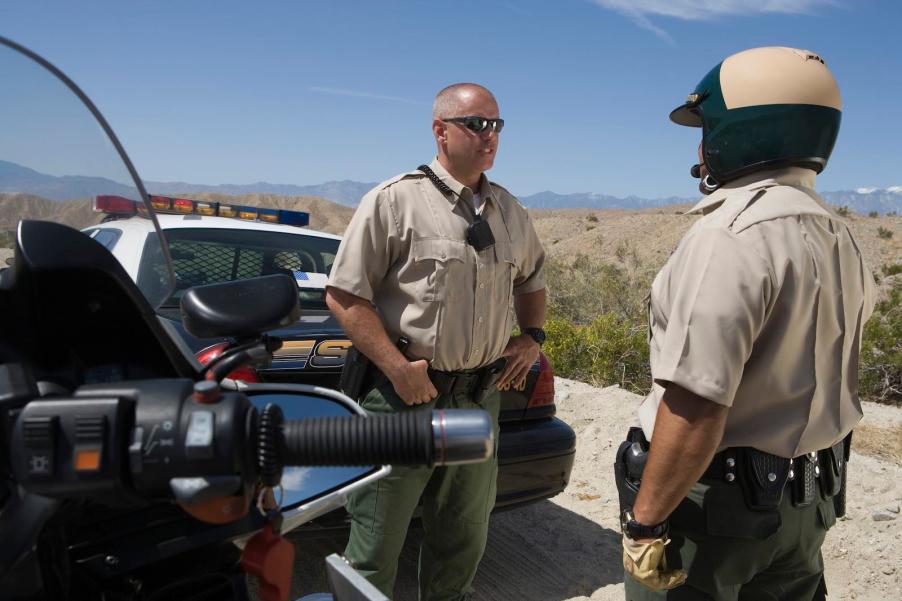
Can one police officer pull another officer over? [Video]
The short answer is: Yes, a police officer can legally pull over an off duty officer or an officer passing through their jurisdiction. They try to avoid it. But it’s happened at least twice recently, and both times the bodycam footage (embedded below) went viral.
My colleague Sarah Kennedy wrote up a police officer pulling over a chief deputy ‘playing’ with an unmarked Dodge Charger. This story comes out of Henry County, Georgia. In the video the Charger blows by a police officer who then pulls it over. The car was doing 96 mph in a 35. When the officer wearing the bodycam gets to the window, he recognizes the driver: Chief Deputy Michael Yarbrough.
Here’s what’s wild: it isn’t Yarbrough’s personal car. He’s driving what the commenter calls a “souped-up” Dodge Charger that belongs to the police force. He was wearing plainclothes but had a uniformed officer in the passenger seat. When the dispatcher asks why the officer was speeding, the investigating officer says, “No reason. He’s just got a high horsepower car. He’s in an unmarked car, and decided he wanted to play.”
He gets told it’s his traffic stop and to handle it how we wants. Over the radio, he admits he “never cared for Yarbrough” and so he writes him a ticket. See the video below:
Yarbrough only got a ticket. Later that was reduced to a warning in court. Here’s why a criminal defense attorney finds that odd:
“When you get into excessive speeding, high 90s, I see a lot of cases where the offender is taken right to jail…They’re given more than just one ticket, it may be coupled with reckless driving or racing…”I’ve dealt with the police that have no problem pulling other officers over for DUI, and they’re not let go,” Fisher said. “So to hear that someone at that high of speed that could put a lot of people at risk …. They should be treated like anyone else.”
Criminal Defense Attorney Kevin Fisher
Our second story is–somehow–even more dramatic. It comes out of Orlando, Florida. Yet again, a sheriff’s deputy was waiting by the roadside. A white SUV blew by him. He clocked it at 80 mph and had to exceed 100 mph to catch it. It turns out it was a marked Orlando Police Department car.
The driver of the police SUV did not want to be pulled over. He saw the blue lights and heard the siren and just kept going. The Seminole County Sheriff’s deputy had to pull his own cruiser in front of the speeding SUV to force its driver to stop.
Then the driver–a uniformed police officer–got out of his SUV to confront the deputy. The deputy said “You’re going 80 in a 45.” The officer’s response? “I’m going into work.” When the investigating officer says, “My name is Deputy Hilton, can I see your driver’s license?” The suspect responds, “No.” You can see the tense moment in the video embedded below:
The Seminole County department identified the speeding city officer as Alexander Shaouni and charged him with reckless driving, and resisting and fleeing an officer. The Orlando Police Department opened an internal investigation and relieved him of duty. Six months later a judge had dismissed the case after a “pretrial intervention” which may have included community service, trainings, or even a mental health evaluation. Shaouni is back on duty.
These incidences contain an interesting parallel. When Yarbrough was pulled over he just smiled and shrugged, he did not look at all concerned about getting a ticket. The investigating officer said, “I’ve never cared for him,” to justify writing the ticket. And when Shaouni confronted the sheriff’s deputy he seemed genuinely confused. He asked, “Why are you trying to pull me over?” and continued referring to the other officer as, “My man.”
On the Police1 website, retired officer Duane Wolfe admits many departments have a culture of “professional courtesy” that makes it less likely they’ll pull another officer over. He added that the result can be so unsafe it puts civilians at risk and urges police to, “Never put another cop in that position.”



